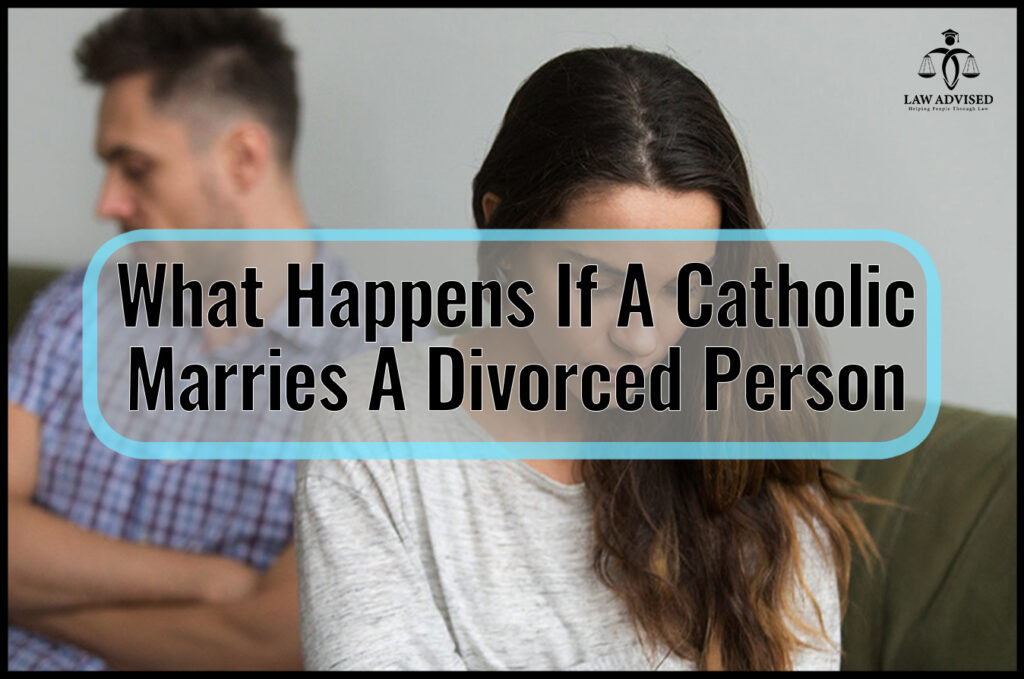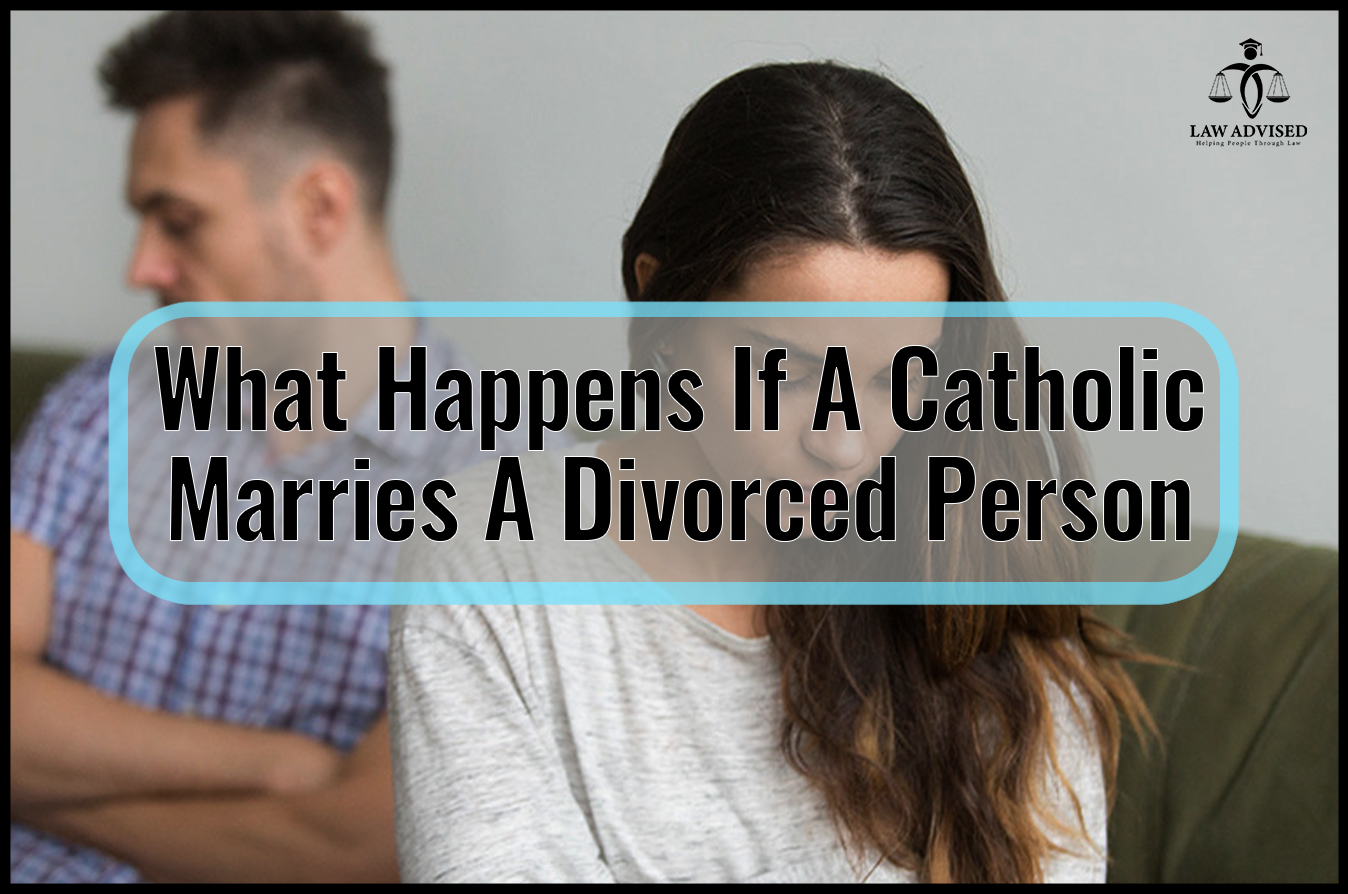If a Catholic marries a divorced person, they may not be able to receive the sacraments of the Catholic Church. This is because the Catholic Church considers marriage to be a lifelong commitment, and divorce is seen as a violation of this commitment.
Marriage is a sacred institution in the Catholic Church, and it is believed to be a lifelong commitment. However, in certain situations, such as when a Catholic marries a divorced person, the church’s stance on marriage can create complications. The Catholic Church does not recognize divorce, as it views marriage as a sacred bond that should not be broken.
Therefore, if a Catholic chooses to marry someone who is divorced, they may face certain restrictions and consequences within the church. We will explore what happens if a Catholic marries a divorced person and the implications it may have on their standing within the church.
Invalidity Of The Marriage
The Church’s stance on the validity of marriage is an important aspect of Catholic doctrine. There are certain factors that can render a marriage invalid. Understanding the impact on the couple’s sacramental status is crucial.
Marriages can be deemed invalid if certain conditions are present. These can include the lack of proper form, meaning that the marriage was not performed in accordance with the requirements of the Church. Other factors include the presence of previous marriages that were not properly annulled, which can lead to issues of bigamy or polygamy.
When a marriage is considered invalid, it means that the sacramental bond between the spouses is not recognized by the Church. This can have implications on the couple’s participation in Sacraments such as the Eucharist or Reconciliation.
It is essential for Catholics considering marriage with a divorced person to fully understand these factors and seek guidance from their local parish and diocese to ensure the validity of their marriage within the Church.
The Process Of Annulment
Understanding the difference between divorce and annulment is essential when it comes to a Catholic marrying a divorced person. In the Catholic Church, divorce is not recognized as a valid dissolution of marriage. Instead, the annulment process is followed to determine if a marriage was null and void from the beginning. Step-by-step, here is a guide to obtaining an annulment:
- Gather relevant documents such as marriage certificates and baptismal records.
- Contact your local Diocese to initiate the annulment process.
- Submit a formal petition, including detailed information about the marriage.
- Wait for the Tribunal to investigate the case and gather evidence.
- Attend a hearing to present your case or nominate a representative to speak on your behalf.
- Receive the decision of the Tribunal, which may take several months.
The significance of the annulment process within the Catholic Church is to determine the validity of a marriage. It aims to establish if there were any impediments that prevented the marriage from being sacramental. Upon receiving an annulment, a Catholic is free to marry in the Church.
Pastoral Care For The Couple
The Catholic Church plays a vital role in providing support to couples where one partner is divorced. Recognizing the complexity of these situations, the Church offers various resources to help navigate the challenges that may arise.
The Role Of The Church In Providing Support
The Church acknowledges the unique circumstances and offers pastoral care to assist the couple in their journey. This encompasses offering guidance on the Church’s stance on marriage, divorce, and annulment, as well as providing spiritual counseling and access to sacraments.
Resources Available For Couples In This Situation
Catholic couples facing the scenario of one partner being divorced can seek assistance from their local parish. Many dioceses have specific support programs designed to address their needs. These programs may include workshops, support groups, and resources for strengthening their relationship.
Addressing The Emotional And Spiritual Needs Of The Couple
Understanding the emotional and spiritual challenges that arise, the Church emphasizes the importance of open communication, forgiveness, and seeking guidance from trained professionals. This enables couples to navigate their unique circumstances while upholding their faith.
Impact On Participation In The Sacraments
Receiving Holy Communion can become a complex issue when a Catholic marries a divorced person. The sacraments play a vital role in the life of a Catholic, and understanding the implications is important.
Examination of the implications of receiving Holy Communion
Receiving Holy Communion for a Catholic who has remarried after divorce depends on various factors. Church doctrine emphasizes the sanctity of marriage, making it challenging for a divorced person to participate fully in this sacrament. It may require seeking an annulment or exploring other options for spiritual support.
The Sacrament of Reconciliation and its role in the process
The Sacrament of Reconciliation becomes crucial for a Catholic in this situation. It allows individuals to seek forgiveness for past actions and provides an opportunity to reconcile with God and the Church. Regular participation in this sacrament can facilitate ongoing spiritual growth, despite the challenges posed by marrying a divorced person.
The importance of ongoing spiritual guidance
Seeking ongoing spiritual guidance from a trusted priest or spiritual director is essential for Catholics in this situation. They can provide guidance, support, and a deeper understanding of the implications of participation in the sacraments. This guidance can help navigate the complexities of marrying a divorced person while remaining faithful to the teachings of the Catholic Church.
Social Implications And Community Perception
Marriage between a Catholic and a divorced person can have social implications and influence community perception. When such a union occurs, dealing with societal judgments and misconceptions becomes essential. It may be challenging for the couple to navigate family dynamics and relationships due to differing beliefs and previous experiences.
However, building a compassionate and understanding community can help alleviate the potential judgment and stigma that may arise. By encouraging open dialogue, fostering empathy, and embracing diversity, individuals can create a supportive environment that respects the choices and circumstances of others. Education and awareness within the community are crucial to dispel misconceptions about divorce and Catholicism, creating a space where understanding and acceptance prevail.
Path To Healing And Moving Forward
When a Catholic marries a divorced person, they may experience various challenges and complexities in their relationship. However, it is important to remember that God’s love and forgiveness are always available to guide them on their path to healing and moving forward.
Embracing God’s love and forgiveness
The first step towards rebuilding and strengthening the relationship is to embrace God’s love and forgiveness. Recognizing that no one is perfect and that we all make mistakes, it is essential for the couple to seek forgiveness from God and from each other. This will create a foundation of trust and grace, allowing them to move past the pain of the past and focus on building a future together.
Throughout their journey, it is important for the couple to find hope and renewal within the Catholic faith. Attending Mass regularly, participating in the sacraments, and engaging in prayer can provide them with spiritual nourishment and guidance. Additionally, seeking guidance from a supportive priest or spiritual mentor can help them navigate the challenges they may face.
In conclusion, while the journey of a Catholic marrying a divorced person may have its challenges, it is ultimately a path toward healing and growth. By embracing God’s love and forgiveness, and finding hope within their faith, the couple can rebuild their relationship and find happiness in their shared journey.
Frequently Asked Questions On What Happens If A Catholic Marries A Divorced Person

Q: Can A Catholic Marry A Divorced Person?
A: Yes, the Catholic Church allows marriages between a Catholic and a divorced person.
Q: What Does The Catholic Church Say About Divorce?
A: The Catholic Church sees marriage as a lifelong commitment and does not recognize divorce.
Q: Can A Divorced Catholic Receive Communion?
A: A divorced Catholic can receive communion if they have not remarried without obtaining an annulment.
Q: What Is An Annulment In The Catholic Church?
A: An annulment is a declaration by the Catholic Church that a marriage was invalid from the beginning.
Q: Does A Divorce Automatically Excommunicate A Catholic?
A: No, a divorce does not automatically excommunicate a Catholic from the church.
Q: Can A Divorced Person Become A Catholic?
A: Yes, a divorced person can become a Catholic, but they may need to go through the annulment process.
Q: Can A Catholic Marry A Non-catholic Divorced Person?
A: Yes, a Catholic can marry a non-Catholic divorced person if they obtain a dispensation from the Church.
Q: How Does The Catholic Church View Second Marriages After Divorce?
A: The Catholic Church considers second marriages after divorce to be invalid unless an annulment is obtained. Note: The answers provided here are based on general knowledge and may vary depending on individual circumstances and local diocesan regulations. It is always advisable to consult a priest or a canon lawyer for specific guidance on this matter.
Conclusion
Marriage between a Catholic and a divorced person can raise important questions within the context of the Catholic Church. It is essential for couples to seek guidance from their local parish and discuss their situation with a priest. Each case is evaluated individually, considering factors such as previous marriages, annulments, and the desire to participate fully in the sacraments.
Understanding the teachings of the Catholic Church and seeking spiritual counsel will help couples navigate this complex situation and find the best path forward.
Ismail Hossain is the founder of Law Advised. He is an Divorce, Separation, marriage lawyer. Follow him.





Leave a Reply